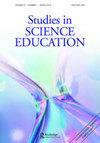A systematic review of trends and findings in research employing drawing assessment in science education
IF 9.9
2区 教育学
Q1 EDUCATION & EDUCATIONAL RESEARCH
引用次数: 39
Abstract
ABSTRACT In this study, we reviewed 76 journal articles on employing drawing assessment as a research tool in science education. Findings from the systematic review suggest four justifications for using drawing as a type of research tool, including assessment via drawing as (a) an alternative method considering young participants’ verbal or writing abilities, and affective or economic reasons, (b) a unique method that can reveal aspects not easily measured by other methods, (c) a major method that reflects characteristics of science subjects, and (d) a formative assessment to diagnose students’ ideas to benefit their learning. Furthermore, five research trends of studies using drawing as assessment tools are identified, including: (a) students’ conceptions of scientists from the Draw-a-Scientist-Test (DAST) and evolving studies, (b) students’ understanding or mental models of science concepts, (c) participants’ conceptions of science learning or teaching, (d) students’ inquiry abilities and modelling skills via drawing, and (e) technology to support drawing. For each trend, we synthesised and commented on the current findings. A framework conceptualising phases and issues when designing research and instruments employing drawing assessments is proposed. The review provides insights into the design and future direction of research employing drawing assessments in science education.对科学教育中使用绘画评估的研究趋势和结果的系统回顾
摘要:在本研究中,我们回顾了76篇关于将绘画评估作为科学教育研究工具的期刊文章。系统评价的结果提出了使用绘画作为一种研究工具的四个理由,包括通过绘画进行评估(a)考虑到年轻参与者的口头或写作能力以及情感或经济原因的替代方法,(b)可以揭示其他方法不易测量的方面的独特方法,(c)反映科学学科特征的主要方法。(d)形成性评估,以诊断学生的想法,以有利于他们的学习。此外,还确定了使用绘图作为评估工具的研究的五种研究趋势,包括:(a)学生从绘图科学家测试(DAST)和不断发展的研究中对科学家的概念,(b)学生对科学概念的理解或心理模型,(c)参与者对科学学习或教学的概念,(d)学生通过绘图的探究能力和建模技能,以及(e)支持绘图的技术。对于每个趋势,我们综合并评论了当前的发现。在设计采用绘图评估的研究和工具时,提出了一个概念化阶段和问题的框架。这篇综述为科学教育中使用绘画评估的研究设计和未来方向提供了见解。
本文章由计算机程序翻译,如有差异,请以英文原文为准。
求助全文
约1分钟内获得全文
求助全文
来源期刊

Studies in Science Education
EDUCATION, SCIENTIFIC DISCIPLINES-
CiteScore
15.30
自引率
2.00%
发文量
7
审稿时长
>12 weeks
期刊介绍:
The central aim of Studies in Science Education is to publish review articles of the highest quality which provide analytical syntheses of research into key topics and issues in science education. In addressing this aim, the Editor and Editorial Advisory Board, are guided by a commitment to:
maintaining and developing the highest standards of scholarship associated with the journal;
publishing articles from as wide a range of authors as possible, in relation both to professional background and country of origin;
publishing articles which serve both to consolidate and reflect upon existing fields of study and to promote new areas for research activity.
Studies in Science Education will be of interest to all those involved in science education including: science education researchers, doctoral and masters students; science teachers at elementary, high school and university levels; science education policy makers; science education curriculum developers and text book writers.
Articles featured in Studies in Science Education have been made available either following invitation from the Editor or through potential contributors offering pieces. Given the substantial nature of the review articles, the Editor is willing to give informal feedback on the suitability of proposals though all contributions, whether invited or not, are subject to full peer review. A limited number of books of special interest and concern to those involved in science education are normally reviewed in each volume.
 求助内容:
求助内容: 应助结果提醒方式:
应助结果提醒方式:


